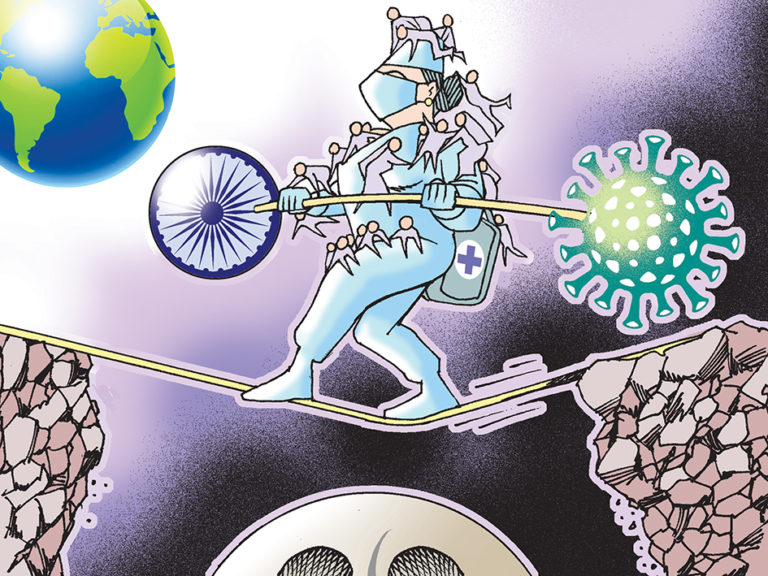- Biography
- Books
- Commentary
- Newspapers
- Asian Age
- Bloomberg Quint
- Business Line
- Business Standard
- Dainik Bhaskar (Hindi)
- Divya Gujarati
- Dainik Jagran (Hindi)
- Divya Marathi
- Divya Bhaskar
- Economic Times
- Eenadu (Telugu)
- Financial Times
- Hindustan Times
- livemint
- Lokmat, Marathi
- New York Times
- Prajavani (Kannada)
- Tamil Hindu
- The Hindu
- The Indian EXPRESS
- Times of India
- Tribune
- Wall Street Journal
- Essays
- Interviews
- Magazines
- Essays
- Scroll.in
- Newspapers
- Speaking
- Videos
- Reviews
- Contact
Times of India
Doing good in India gets harder: Philanthropy should be regulated by an independent regulator, not by the home ministry
| November 4, 2020 - 00:43Indira Gandhi’s Emergency was a tragedy in modern India’s history. A second tragedy was not to have undone the terrible laws enacted during the Emergency. One of these is the Foreign Contributions (Regulations) Act or FCRA, which was amended last month and has become more draconian.
India’s language conundrum: The National Education Policy has skirted elegantly a political minefield. But the obstacle is the teacher
| September 20, 2020 - 22:24In 1947, a weary Britain packed up and left India, leaving behind absent-mindedly the English language and a headache for Indians. Ever since, we’ve been quarrelling over the place of English in our lives, particularly in what language to teach our children. The latest to join the debate is the National Education Policy (NEP), which to its credit, has skirted elegantly a political minefield, coming up with an answer that has satisfied almost everyone, offending only those who insisted on being offended. But the obstacle is the teacher.
One and a half cheers: National Education Policy promises much, but fails to come to grips with India’s education crisis
| August 11, 2020 - 21:37
There is so much good in the recently announced National Education Policy (NEP) that it seems churlish to point out its failings. It will receive well deserved applause. However, the truth is that it has failed to come to grips with the crisis in Indian education. I will focus only on schooling, the crucial foundation of the edifice. Instead of three cheers, I am afraid I can only offer it one and a half.
Who shall live? Who shall die? India faces Sophie’s Choice: our tragic dilemma is to choose between present lives and future lives
| April 20, 2020 - 15:26The old idea that civilisation is destroyed from within, not from without, has been turned upside down. In just a few weeks a virus ten-thousandth of a millimetre in diameter has spread around the world like wildfire from a market in Wuhan, to threaten our civilised order. How we respond to the moral dilemmas raised by Covid-19 will reflect on our values and the number of lives we save.

India is free, its schools are not – Reform must have two legs: Autonomy for private schools and quality for government schools
| February 7, 2020 - 17:34Another Republic Day has come and gone, with an unhappy reminder of the tragic gap between our aspirations and the harsh reality. For 70 years we have wanted our children to grow up into free thinking, confident and innovative Indians. But our education system has done everything possible to disempower them. It is a heart breaking sight to see long lines of parents waiting year after year to get their child into a decent school. Most of them are doomed to failure as there aren’t enough places in good schools.
Finally, some good news!
| January 23, 2020 - 04:21Take the long view and you will find the world is getting better
Ten steps to $5 trillion: Lesson from RCEP fiasco is that India must execute bold reforms to become competitive
| December 4, 2019 - 02:57November 4, 2019 was a sad day. Prime Minister Narendra Modi decided to walk out of the Regional Comprehensive Economic Partnership (RCEP) negotiations at the eleventh-hour, admitting that India couldn’t compete with Asia, especially China. It was a big and painful decision as this is no ordinary trade agreement. Had India joined, RCEP would have become the world’s largest free trade area comprising 16 countries, half the world’s population, 40% of global trade and 35% of world’s wealth in the fastest growing area of the world.
In search of a conservative Indian: We are drowned today by the shrill noises from Hindu nationalists and left secularists
| October 31, 2019 - 15:05The precipitous decline of Congress worries many Indians who believe that choice and a responsible opposition are important. Democracies elsewhere offer a choice between liberals and conservatives through a two-party system. Liberals prefer modernity while conservatives favour tradition and continuity; liberals want rapid change, conservatives prefer it to be gradual. Conservatives tend to be more nationalistic, religious and market oriented; liberals are more secular and oriented to social welfare.
Is Milton Friedman dead? Not quite. Individual social responsibility, not corporate social responsibility, must be the mantra
| September 5, 2019 - 18:16Capitalism has been on the defensive ever since the global financial crisis of 2007-08. Young people in the West have been turning away from the market system because of widening inequality, revulsion against high CEO salaries, and deepening distrust of business. By 2016, half of America between 18 and 29 years of age rejected capitalism in a Harvard study (with one-third supporting socialism.) Two years later, a Gallup poll in 2018 confirmed these findings when only 45% in the same age group expressed a positive opinion of capitalism.
Contra Hindutva, Kashmiriyat: How consent works in a world of invented nations and fictional nationalisms
| August 28, 2019 - 15:27The recent change in the political status of Kashmir has deeply wounded the Kashmiris. There is anger, fear, alienation and loss of self-respect. Many have addressed the hurt to Kashmiriyat from a legal or historical perspective. But what is needed is a deeper appreciation of the fact that national and regional identities are imagined creations. Both Hindutva and Kashmiriyat are invented. The only real 'consent of the people' is the desire of a person to live in a country.

